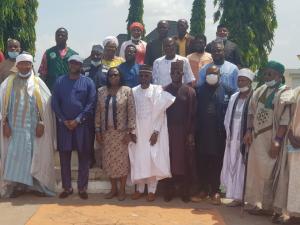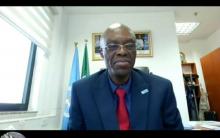WHO strengthening collaboration with the Kogi State Government in outbreak responses and health security
Lokoja, 14 October, 2021 - The World Health Organization (WHO) is in collaborating with the Kogi State Government to respond to the ongoing cholera outbreak and to reinforce surveillance for other Health Security risks. The Kogi State Government recently held a town hall meeting to galvanize multi-level whole of society state leadership for the Cholera outbreak response.
Speaking at the meeting, via a zoom link, the WHO Representative to Nigeria, Dr Walter Kazadi Mulombo, congratulated the state leadership for bringing together the diverse state leaders that included local government chairmen, traditional, religious and private sector leaders in the state. He emphasized the need to intensify surveillance across all epidemic prone diseases and other health security risks in the state. He particularly singled out the need for further strengthening of state surveillance and response capacities.
He commended the Kogi State Government for quickly curtailing the cholera outbreak and pointed out the need for consolidating the achievements made with additional investments in critical areas to mitigate the risk of multiple disease outbreak threats that include COVID-19, cholera, Lassa Fever, Yellow Fever, Cerebral spinal Meningitis, vaccine-derived polio virus, among others.
This, he said, can be done by providing additional laboratory reagents and testing kits, motivation of staff, intensifying community sensitization, provision of treatment centres and supplies and training of health workers.
The town hall meeting was sponsored by WHO as a platform to galvanize state leadership, review the response to the ongoing cholera outbreak, and raise awareness among the people on the importance of ensuring good health practices.
Since the beginning of 2021, Nigeria has reported frequent cholera outbreaks in several states, including Kogi State. The number of confirmed and suspected cases reported nationally as of 03 October (88, 704) exceeds the number of cases reported in 2000 and 2019 respectively.
Kogi State has reported 151 suspected cases, 34 deaths resulting in a 22.5% case fatality ratio as a result of delayed identification and treatment of initial cases. This was however quickly corrected with establishment of 4 treatment centres, removal of user fees, medical supplies, strengthened surveillance for cholera, training of health workers and sensitization of communities on water, sanitation and hygiene best practices. The State has not reported new cases since week 34.
Cholera is an acute diarrheal infection of food or water contaminated with the bacterium Vibrio Cholerae. Cholera is fatal if not quickly treated.
Dr Mulumbo assured that WHO will continue to work closely with Kogi state to support capacity building for evidence-based decision making and ensure effective guidance on monitoring and evaluation of your policies and interventions on health.
“I would therefore encourage your Excellency to accelerate the implementation of the Basic Health Care Provision Funds (BHCPF) activities, address the inadequacies, maldistribution and motivation of skilled health personnel, and pursue to obtain the full benefits of rolling out of the State Health Insurance Scheme” he said.
Meanwhile, Kogi State Deputy Governor, Chief Edward Onoja, appreciated WHO for its support and assured that the state government would not relent to provide health security for its citizens.
Chief Onoja, representing the governor, said some of the government's achievements in the health sector included - the construction of a new referral tertiary hospital in Okene, the renovation of the specialist in Lokoja, the renovation of other general hospitals across LGAs in the state, the establishment of the Kogi State Health Insurance Agency and enactment of the Primary Health Care Under One Roof Law.
He said while the government is doing its part to provide amenities for the residents, they should play their part by imbibing hygienic practices because most outbreaks like cholera are traceable to poor hygiene.
He called on the traditional and religious leaders to be vanguard for public health issues and sensitize their people about the importance of maintaining good hygiene. He also urged organised labour to sensitise their members on the importance of the health insurance scheme and the need to subscribe to reduce medical out of pocket expenses among the people of the state.
The town hall meeting was attended by government officials, traditional and religious leaders, local government chairmen, market women, organized labour leaders and health experts.
WHO is currently supporting Kogi state in all pillars relating to health emergencies including Cholera, Covid-19, and other Vaccine-Preventable Disease outbreaks. In line with the WHO Transformation Agenda, and the Country Cooperative Strategy, the WHO Nigeria is focusing on shaping priorities and investments to improve Universal Health Coverage and provide resilience for health insecurities.




